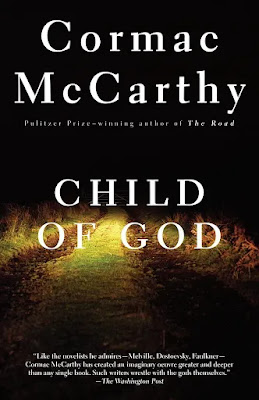“Child of God,” by Cormac McCarthy, 1973
The title is sarcasm.
McCarthy, a dark horse who sees himself as our new Faulkner, penned a
novel that is more like a sick potboiler of horror than a literary work ala
Faulkner. Faulkner wrote un-sensational Southern
noir swimming in Jim Crow, unlike the loyal Catholic Flannery O’Connor, who also wrote stories dipped in horror. Unlike McCarthy and O’Connor, Faulkner never
overdid it. Faulkner's writing seems real, if
hallucinatory. McCarthy in this story instead plumbs
the depths of hillbilly stereotypes about loners living in the hills of East Tennessee . I
will not reveal the horror story here, but only to say it becomes so weird it
is laughable. My Precious! Tell me this is based on a real news story, please? McCarthy claims it is based on a real person. If this is true, then it only confirms all
the hatred Northerners have for hillbillies and ‘red-necks.’ It is McCarthy’s gift to them.
The question is why would someone bother writing about such
an outlier? Many of McCarthy’s books –
not all - dwell on violence, isolation and perversion as somehow normal. Is this in a sense a reactionary writer offering
up demons as the real heart of humanity?
Certainly in this novel it is so.
There is a religious angle to this, but damned if I can figure it out. A plea that even the most barbaric humans must be pitied and forgiven? Somehow, it doesn't work here.
McCarthy is a poet with words. ‘Suttree,’ one of his best novels and poetic
at that, took 20 years to write, published in 1979. This slim volume was published in 1973 and seems
like a strange warm-up to ‘Suttree.’ Both take place in East
Tennessee , where McCarthy hung out for several years as a
poverty-stricken tramp. It is set in Sevier County ,
around Knoxville
Lester Ballard is a loner and ace shot and lives on
squirrels, stolen eggs and vegetables in a cave hard by the Great
Smoky Mountains . He's sort of like Gollum from LotR. Daddy was
in an off-shoot of the Klan, the White Caps. The story
is told from Ballard’s point of view, from the view of the people in town who reflect on
him and in just plain third person. Eventually
Ballard goes from loner to totally alone – outside society in every way. Is this a cautionary tale about the endpoint
of total male ‘independence’? The fantasy of living in the woods without anyone or anything? Some
would see it that way too. In a sense,
only human society restrains some people from falling off the edge.
Cormac McCarthy wrote “The Road,” and “Suttree.”
(Both reviewed below)
And I did not buy it at Mayday Books
Red Frog
June 5, 2013



No comments:
Post a Comment